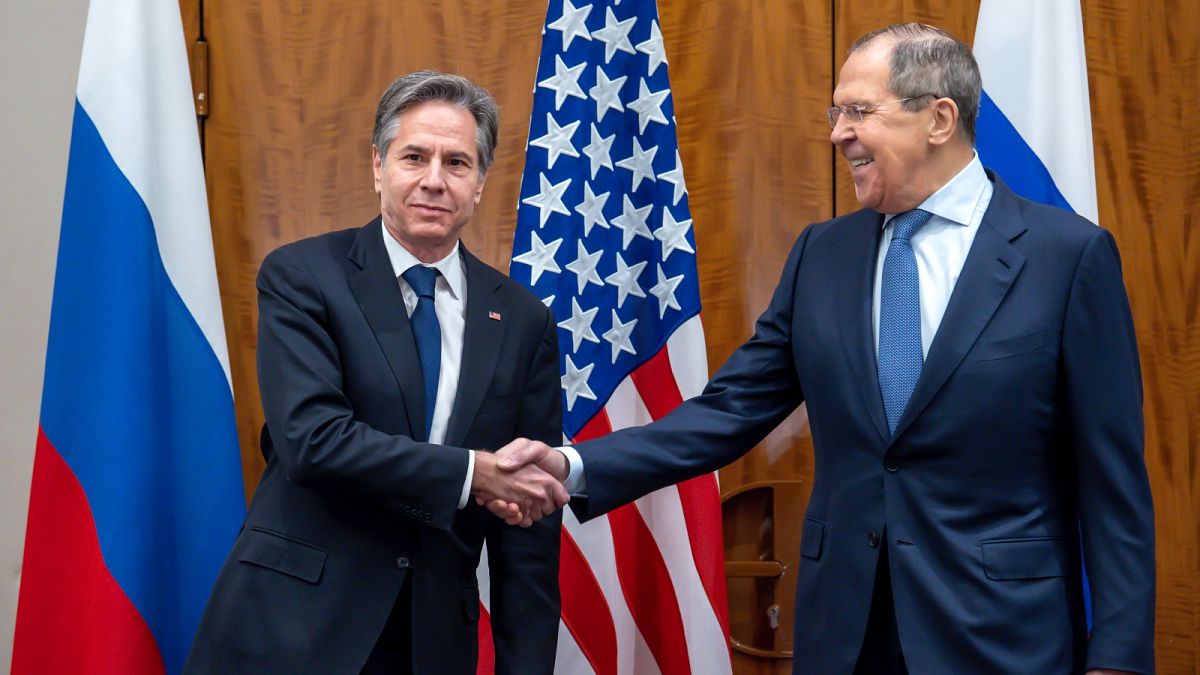These new talks, which seek to de-escalate the crisis at the Ukrainian border, come 11 days after a first round of discussions in the Swiss city yielded little result.
The top diplomats from Russia and the US described their talks in Geneva on Friday as "useful" and left the door open for further meetings in the coming weeks.
Russia's foreign minister told reporters that Washington had agreed to respond to Russia's demands over NATO positions next week. He, however, refused to characterise Washington's promise of a written response as a positive step.
“I can’t say whether we are on the right path or not. We will see when we get the American responses," he said.
Blinken, who described their meeting as a "candid exchange of concerns and ideas", stressed however that the US intends "not only to respond to the concerns that Russia has raised but to share our concerns, which are many."
He said the written response would be sent after extensive consultations with allies and added he expects the two sides "to meet again after Russia has had an opportunity to look at this paper and then we'll see where we go from there."
The US diplomat said the next meetings will probably remain at the ministerial level but that President Joe Biden is "certainly prepared" to meet with his Russian counterpart Vladimir Putin if both sides agree this would be the best way forward.
The meeting in Geneva, Switzerland, sought to de-escalate the crisis at the Ukrainian border and came 11 days after the first round of discussions in the Swiss city yielded little result.
Russia has amassed some 100,000 troops on the border and is being accused by the US of planning an invasion, which it denies.
Instead, it accuses the West of plotting “provocations” in Ukraine, citing the delivery of weapons to the country by British military transports in recent days.
Russia wants binding security guarantees, including a permanent prohibition on Ukrainian membership in NATO, to which Kyiv aspires, and the removal of most of the US and allied military presence in eastern Europe.
Washington, Brussels and NATO have rejected these demands and warned that any attack on Ukraine would have costly consequences.
Blinken's whirlwind European tour
Both Blinken and Lavrov had muted expectations ahead of their sit-down, stressing that any breakthrough was unlikely.
Just 20 minutes before the start of the meeting, Moscow announced that it wants foreign NATO troops out of Romania and Bulgaria as part of any treaty.
Bucharest has categorically rejected this demand. The Foreign Ministry said in a statement that Russia's request for NATO troops to be reduced in all states that joined the alliance after 1997 is "unacceptable and cannot be the subject of negotiation, given that the deterrence and defence posture if inextricably linked to, and an intrinsic part of, NATO's collective defence mechanism, over which no third state can have a veto."
It added that NATO troops' presence in allied countries "is a strictly defensive reaction to the increasingly aggressive behaviour of the Russian Federation in the Eastern Neighbourhood, especially since 2014 when the Ukrainian territory of Crimea was illegally occupied by Russia."
Blinken told reporters the US and its allies remain committed to "fundamental principles" including the "sovereign right of the Ukrainian people to write their own future".
He also said the strengthening of NATO's presence on its eastern flank, including in Romania, is in effect, a consequence of Russian aggression. He said he asked Lavrov to explain Russia's actions since "so many of the things that you've done in recent years have precipitated virtually everything you say you want to prevent" including Ukraine's rapprochement to NATO.
Blinken said that "in a sense" only Putin knows what Russia's end goal is in building up troops on the Ukrainian border.
But the US' chief diplomat conceded that "there are areas where on a reciprocal basis we can address each other's concerns" such as providing "greater transparency in our military practices" in order to "build trust".
He reiterated however that any further Russian aggression against Ukraine would result in "swift, severe costs to their economy" and that he told Lavrov that there can be "nothing about Ukraine without Ukraine, nothing about NATO without NATO, nothing about Europe without Europe."
Blinken arrived in Geneva after a whirlwind tour that took him from Kyiv to Berlin, the city that symbolised the reunification of Europe after the Cold War, for talks with German, French and British allies.
Russia's military manoeuvres
The meeting came a day after the Kremlin denounced as "destabilising" remarks by US President Joe Biden that promised a severe response from the US and its allies in case of a Russian military incursion into Ukraine. Moscow argued Biden's comments could give ideas to "hotheads among Ukrainian officials".
In initial talks last week in Switzerland, US Assistant Secretary of State Wendy Sherman proposed building on the defunct Intermediate-range Nuclear Forces (INF) disarmament treaty signed during the Cold War with Moscow.
In 2019, former US President Donald Trump withdrew from the treaty, accusing Russia of violations.
Biden said on Wednesday he was ready for a new summit with Vladimir Putin, after the one on 16 June 2021, also in Geneva.
Russia did not say no to the proposals on missiles and manoeuvres but reiterated that this was not the main issue. For good measure, it announced on Thursday large-scale naval manoeuvres in January and February in the Atlantic, Arctic, Pacific and Mediterranean.
The head of US diplomacy urged Putin on Wednesday to choose the "peaceful path" and he also made it clear that he would not propose written answers to the very detailed demands made a few weeks ago by the Russians on the points of contention.
